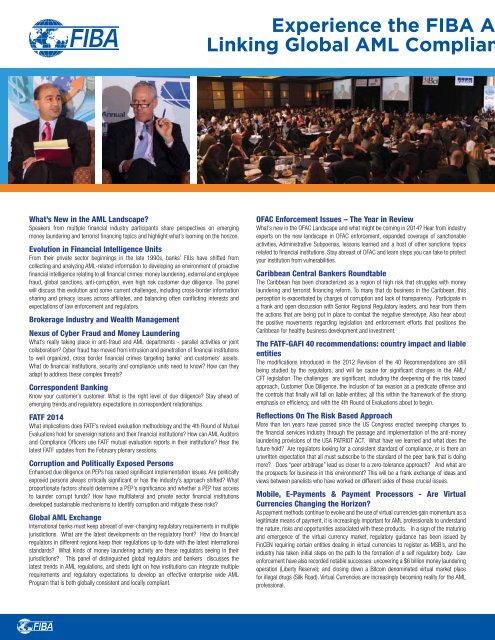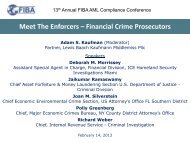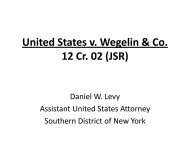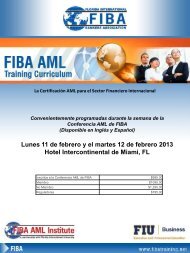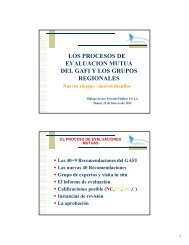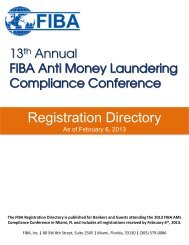Advisory Committee
to download - 2014 FIBA Anti Money Laundering Compliance ...
to download - 2014 FIBA Anti Money Laundering Compliance ...
- No tags were found...
Create successful ePaper yourself
Turn your PDF publications into a flip-book with our unique Google optimized e-Paper software.
Experience the FIBA A<br />
Linking Global AML Complian<br />
What’s New in the AML Landscape?<br />
Speakers from multiple financial industry participants share perspectives on emerging<br />
money laundering and terrorist financing topics and highlight what’s looming on the horizon.<br />
Evolution in Financial Intelligence Units<br />
From their private sector beginnings in the late 1990s, banks’ FIUs have shifted from<br />
collecting and analyzing AML-related information to developing an environment of proactive<br />
financial intelligence relating to all financial crimes: money laundering, external and employee<br />
fraud, global sanctions, anti-corruption, even high risk customer due diligence. The panel<br />
will discuss this evolution and some current challenges, including cross-border information<br />
sharing and privacy issues across affiliates, and balancing often conflicting interests and<br />
expectations of law enforcement and regulators.<br />
Brokerage Industry and Wealth Management<br />
Nexus of Cyber Fraud and Money Laundering<br />
What’s really taking place in anti-fraud and AML departments - parallel activities or joint<br />
collaboration? Cyber fraud has moved from intrusion and penetration of financial institutions<br />
to well organized, cross border financial crimes targeting banks’ and customers’ assets.<br />
What do financial institutions, security and compliance units need to know? How can they<br />
adapt to address these complex threats?<br />
Correspondent Banking<br />
Know your customer’s customer. What is the right level of due diligence? Stay ahead of<br />
emerging trends and regulatory expectations in correspondent relationships.<br />
FATF 2014<br />
What implications does FATF’s revised evaluation methodology and the 4th Round of Mutual<br />
Evaluations hold for sovereign nations and their financial institutions? How can AML Auditors<br />
and Compliance Officers use FATF mutual evaluation reports in their institutions? Hear the<br />
latest FATF updates from the February plenary sessions.<br />
Corruption and Politically Exposed Persons<br />
Enhanced due diligence on PEPs has raised significant implementation issues. Are politically<br />
exposed persons always critically significant or has the industry’s approach shifted? What<br />
proportionate factors should determine a PEP’s significance and whether a PEP has access<br />
to launder corrupt funds? How have multilateral and private sector financial institutions<br />
developed sustainable mechanisms to identify corruption and mitigate these risks?<br />
Global AML Exchange<br />
International banks must keep abreast of ever-changing regulatory requirements in multiple<br />
jurisdictions. What are the latest developments on the regulatory front? How do financial<br />
regulators in different regions keep their regulations up to date with the latest international<br />
standards? What kinds of money laundering activity are these regulators seeing in their<br />
jurisdictions? This panel of distinguished global regulators and bankers discusses the<br />
latest trends in AML regulations, and sheds light on how institutions can integrate multiple<br />
requirements and regulatory expectations to develop an effective enterprise wide AML<br />
Program that is both globally consistent and locally compliant.<br />
OFAC Enforcement Issues – The Year in Review<br />
What’s new in the OFAC Landscape and what might be coming in 2014? Hear from industry<br />
experts on the new landscape in OFAC enforcement, expanded coverage of sanctionable<br />
activities, Administrative Subpoenas, lessons learned and a host of other sanctions topics<br />
related to financial institutions. Stay abreast of OFAC and learn steps you can take to protect<br />
your institution from vulnerabilities.<br />
Caribbean Central Bankers Roundtable<br />
The Caribbean has been characterized as a region of high risk that struggles with money<br />
laundering and terrorist financing reform. To many that do business in the Caribbean, this<br />
perception is exacerbated by charges of corruption and lack of transparency. Participate in<br />
a frank and open discussion with Senior Regional Regulatory leaders, and hear from them<br />
the actions that are being put in place to combat the negative stereotype. Also hear about<br />
the positive movements regarding legislation and enforcement efforts that positions the<br />
Caribbean for healthy business development and investment.<br />
The FATF-GAFI 40 recommendations: country impact and liable<br />
entities<br />
The modifications introduced in the 2012 Revision of the 40 Recommendations are still<br />
being studied by the regulators, and will be cause for significant changes in the AML/<br />
CFT legislation. The challenges are significant, including the deepening of the risk based<br />
approach, Customer Due Diligence, the inclusion of tax evasion as a predicate offense and<br />
the controls that finally will fall on liable entities; all this within the framework of the strong<br />
emphasis on efficiency, and with the 4th Round of Evaluations about to begin.<br />
Reflections On The Risk Based Approach<br />
More than ten years have passed since the US Congress enacted sweeping changes to<br />
the financial services industry through the passage and implementation of the anti-money<br />
laundering provisions of the USA PATRIOT ACT. What have we learned and what does the<br />
future hold? Are regulators looking for a consistent standard of compliance, or is there an<br />
unwritten expectation that all must subscribe to the standard of the peer bank that is doing<br />
more? Does “peer arbitrage” lead us closer to a zero-tolerance approach? And what are<br />
the prospects for business in this environment? This will be a frank exchange of ideas and<br />
views between panelists who have worked on different sides of these crucial issues.<br />
Mobile, E-Payments & Payment Processors - Are Virtual<br />
Currencies Changing the Horizon?<br />
As payment methods continue to evolve and the use of virtual currencies gain momentum as a<br />
legitimate means of payment, it is increasingly important for AML professionals to understand<br />
the nature, risks and opportunities associated with these products. In a sign of the maturing<br />
and emergence of the virtual currency market, regulatory guidance has been issued by<br />
FinCEN requiring certain entities dealing in virtual currencies to register as MSB’s, and the<br />
industry has taken initial steps on the path to the formation of a self regulatory body. Law<br />
enforcement have also recorded notable successes: uncovering a $6 billion money laundering<br />
operation (Liberty Reserve); and closing down a Bitcoin denominated virtual market place<br />
for illegal drugs (Silk Road). Virtual Currencies are increasingly becoming reality for the AML<br />
professional.


